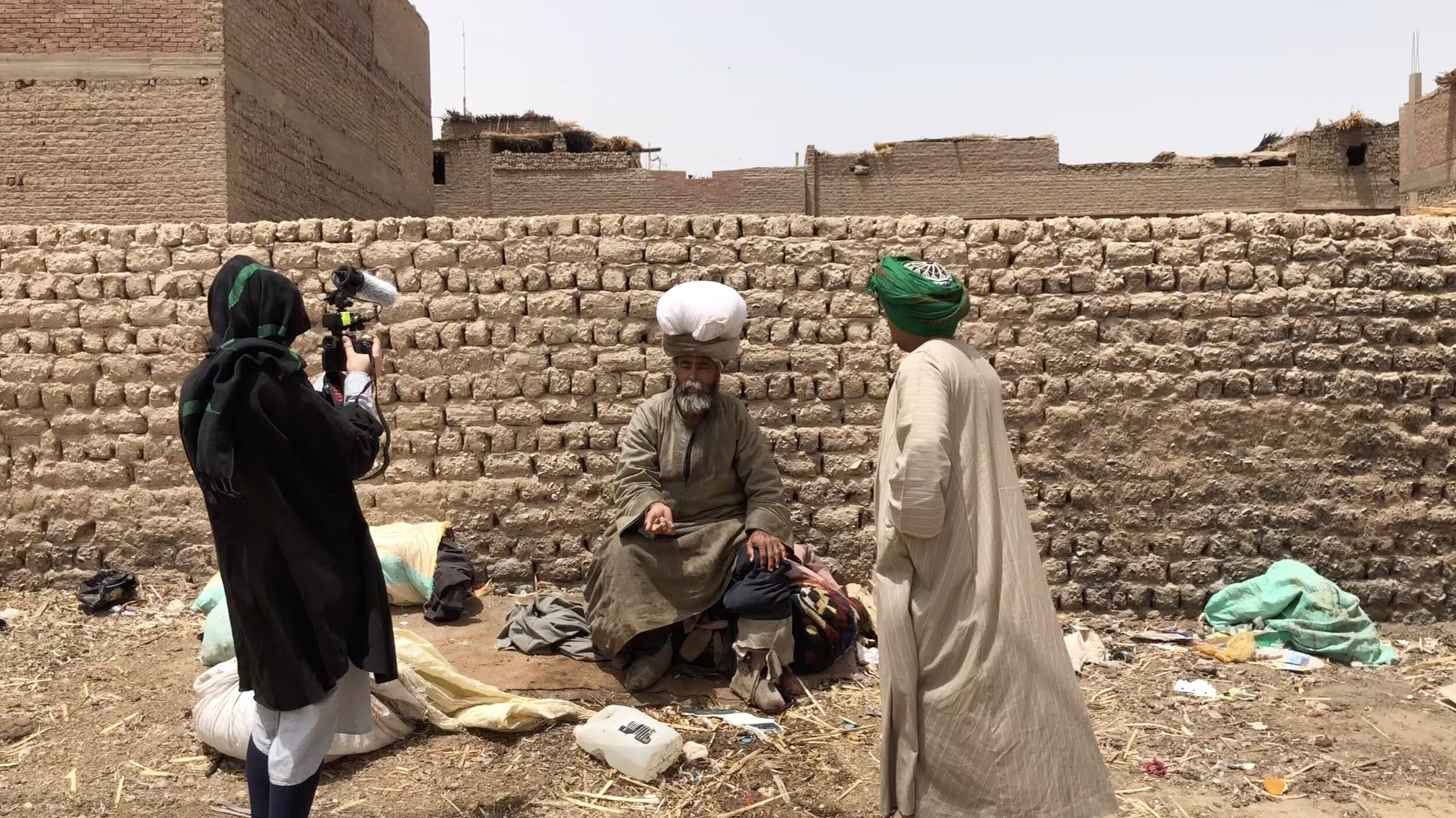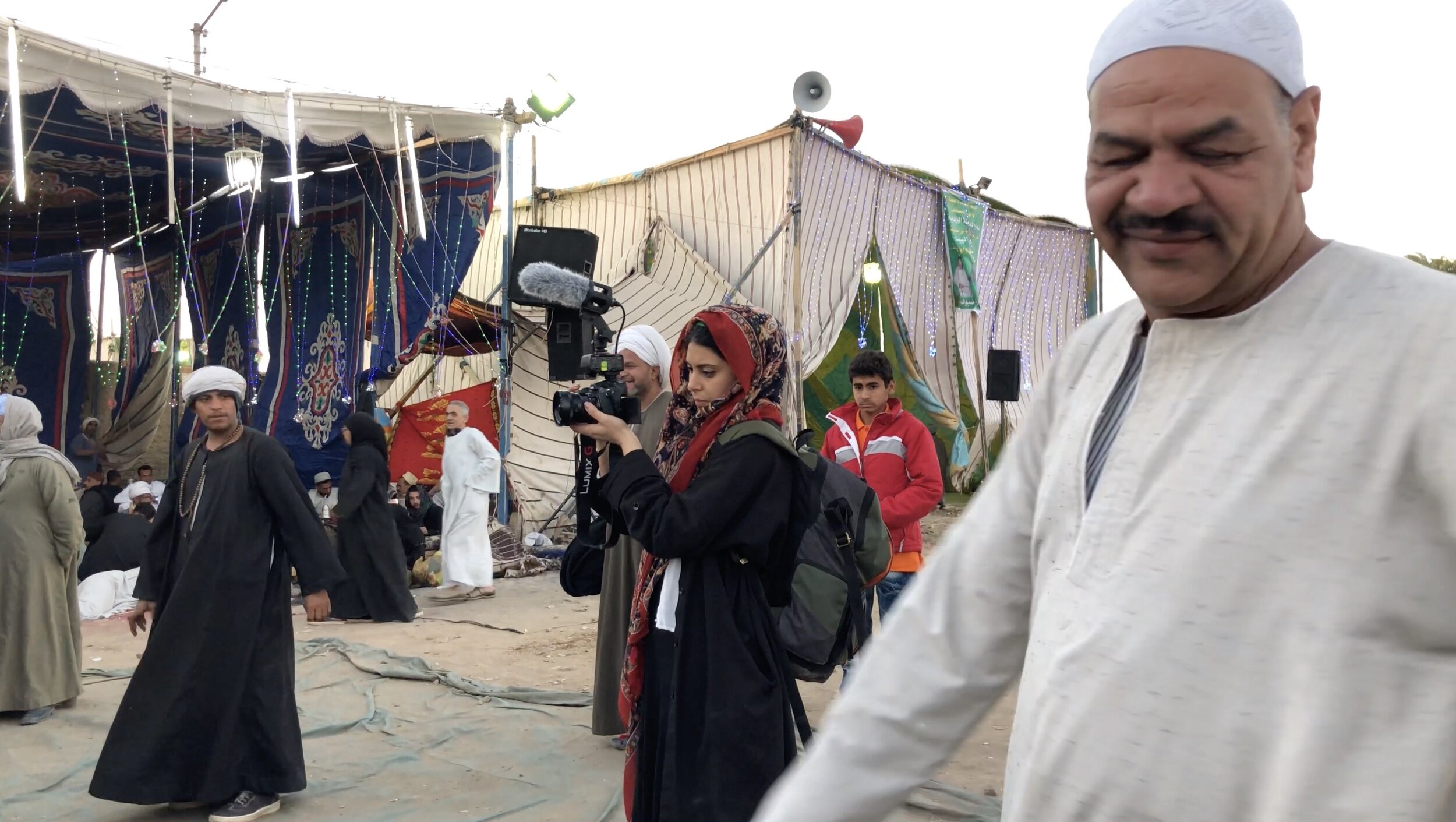Sufi Ecstasy: Egypt’s Hidden Mawlid Festivals
Our latest Free of the Week takes us into the depths of rural Egypt to discover the mystical Sufi Mawlid celebrations, traditional festivals where locals gather to experience divine ecstasy through chanting, dancing and shared experience.
Director Yasmin Kamal gives us some background to this unique film, shot in a vérité style to give the audience an experiential viewing that is sure to overload the senses and make you question what is real.
Featured by BBC Arabic, the film now has over 100,000 views but has been met with criticism by some traditional Muslim commentators who consider the practice to be blasphemous.
My film ‘Sufi Ecstasy: a journey through spiritual Egypt’ explores the cultural, social and religious relevance of the traditional Mawlid celebration and its significance today within Egyptian culture. We follow Nasser, an illiterate Sufi farmer from his home in Sohag in the South of Egypt to the weeklong celebrations of the Saint, Sidi Abdel Reheem el Qinawi in the city of Qina.
Much of contemporary Egyptian society lives in poverty and social deprivation, particularly outside of the more developed cities with rates of illiteracy approaching 70%. With the unrelenting socio – economic and political pressures, communities work to preserve their traditions and to express their religious interpretations in their unique way: The Mawlid is an important example of this.
In 2014, having completed work on Academy Award nominated film ‘The Square’ documenting the Egyptian uprising of the Arab Spring, I was encouraged to escape the political turmoil and spend time in rural Egypt. A trip that I had intended to last a few days turned into a month. There I attended a number of Mawlid festivals, each one varying in character based on locality, and met some remarkable people.
Celebrations take place around the shrine of the celebrated saint where temporary spaces are erected for the duration of the Mawlid, resulting in some incredible displays of public mobilisation. Once you move past popular amusements and stalls selling cheap traditional toys and street food, you enter the world of the different Sufi groups’ Khidmas. The Khidma is the name given to the basic physical structure of Sufi celebrations and functions as a devotional service to God. Suspension of class division and hierarchy is a core tenet and visitors are provided with a place to sleep as well as offered food and drink.
Director Yasmin Kamal during filming alongside Nasser
The Khidma is also where the Zikr takes place, a contentious and often misunderstood ritual. The Zikr takes the form of collective chanting and ecstatic dance which brings worshippers to the point of divine spiritual elevation and closeness with God by way of an altered consciousness and in some cases complete dissociation from the self.
Described by the anthropologist Samuli Schielke as a “carnivalesque utopian festival where the boundaries and norms of ordinary life are temporarily suspended”, the Mawlid stands triumphantly in the face of a rigid and unforgiving political system. The Mawlid is so bizarrely singular, chaotic and non–conformist that any government attempting to repress it has only inspired new and creative ways to sustain it. Despite its religious context the festival transcends religion as well as restrictions that governments have attempted to impose over the years. In many ways it continues to endure as the only public space left permitting freedom of expression in Egypt.
Khidma’s are erected during Mawlids as a physical space where Sufis can practice their devotion to God.
I met Nasser at a Mawlid in Cairo where he was independently organising a Khidma. Before the festival, he would often collect or save his own money to organise a Khidma and would offer visitors what he could in terms of food, drink and a place to stay. He pays visits to the Saints in the hope of receiving blessings and messages from them. A divisive character, Nasser is considered a ’Sheikh’ to some and a con artist to many. Moving freely among women, men, rich or poor, thieves and dervishes, he has a unique ability to draw together different strands of Egyptian society. Festival goers would seek him out to discuss personal problems, with Nasser offering council on a variety of predicaments but especially matters of the heart.
Shortly after meeting Nasser I met his now ex-wife Iman. Unbowed by a number of traumatic life experiences she remained a bold, playful character - if a little hostile and suspicious during our first encounters. In public spaces she adopted masculine traits and preferred to cross-dress in clothing traditional to the men of Southern Egypt, explaining to me that this enabled her to navigate the heavily patriarchal society with greater ease. A focus on Iman and Nasser’s relationship wasn’t planned but it became a key part of the film when I got to the edit.
Nasser in prayer
The film addresses the way in which Sufis are denounced and disparaged by the traditional Islamic community in Egypt with the film allowing space for characters including Nasser to discuss how they defend their traditions in the face of this hostility. Crucially it also captures the elements of Sufism expressed in context of the the Mawlids including Zikr, the process of Khidma and animal sacrifices, controversial Quranic interpretations and devotional love and surrender which are at the core of Sufi practice and thought.
The film has been praised, but also heavily criticised by some traditional Islamic commentators. Several angry videos have been created in response and one in particular, which was shared on YouTube, has thousands of views. It describes those featured as “unIslamic” and dissects the film with a narrator expressing his disgust and branding Nasser blasphemous. This is just one example highlighting the fear and anger that comes when exploring or instigating any kind of dialogue around Islam which focuses on the spiritual rather than the dogmatic.
Director Yasmin Kamal filming Zikr during a Mawlid
In spite of this, I remain adamant that rigid Islamic thought is not what prevails across the Islamic world. Those who fear Islamic discourse continue to contribute to the regression of a natural religious evolution, fearing change and loss of control.
‘Sufi Ecstasy’ should be regarded as a taster for a full feature film that I am currently working on. Through continued focus on the Mawlids and three central characters including: a young boy (visiting Mawlids with his family and their travelling fairground), a young woman and and traditional Sufi singer, the film will explore all things social, political and religious during and in the time between the Mawlids.
Yasmin is currently meeting with potential collaborators, looking for help in the funding and production of her feature film project. If you’re interested or know someone who might be, please get in touch at contactdcweekly@gmail.com .











